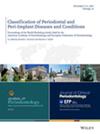Oxidative balance scores in Korean adults are associated with periodontitis
Abstract
Background
The Oxidative Balance Score (OBS) is a comprehensive metric that assesses the state of a person's oxidative balance. This study aimed to investigate the relationship between the oxidative balance score and moderate and severe periodontitis in a representative sample of Korean adults.
Methods
Healthcare big data from the 7th Korea National Health and Nutrition Examination Survey (2016–2018) was used, and 16,489 adults aged ≥19 years were included. Multivariate logistic regression analysis was performed to investigate the effect of sex-specific oxidative balance scores on periodontitis.
Results
In comparison with participants with a lower oxidative balance score, those with a higher oxidative balance score had a lower incidence of moderate and severe periodontitis (p < 0.05). After adjusting for covariates, the oxidative balance score was negatively associated with moderate (odds ratio [OR] = 0.952; 95% confidence interval [CI]: 0.934–0.971) and severe (OR = 0.958; 95% CI: 0.931–0.986) periodontitis; however, the result was not significant for severe periodontitis in women's (OR = 0.975; 95% CI: 0.934–1.018). Our study showed a statistically significant association between OBS and moderate and severe periodontitis, the small effect size should be interpreted with caution.
Conclusions
The oxidative balance score was associated with moderate and severe periodontitis in Korean adults. Therefore, managing this score may help reduce the risk of periodontitis.

 求助内容:
求助内容: 应助结果提醒方式:
应助结果提醒方式:


